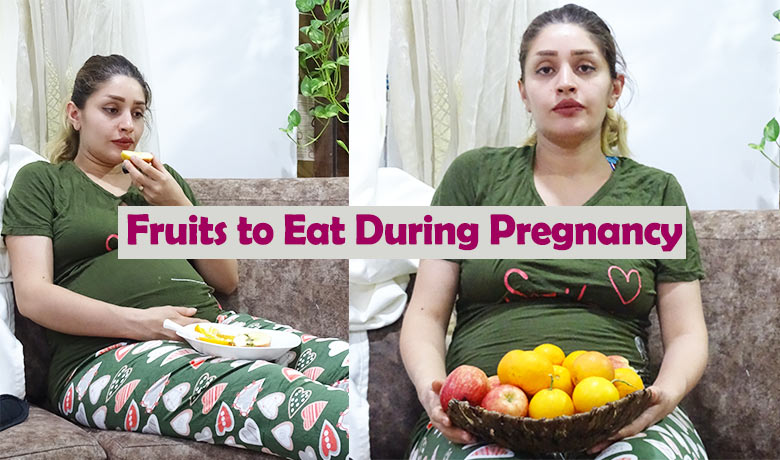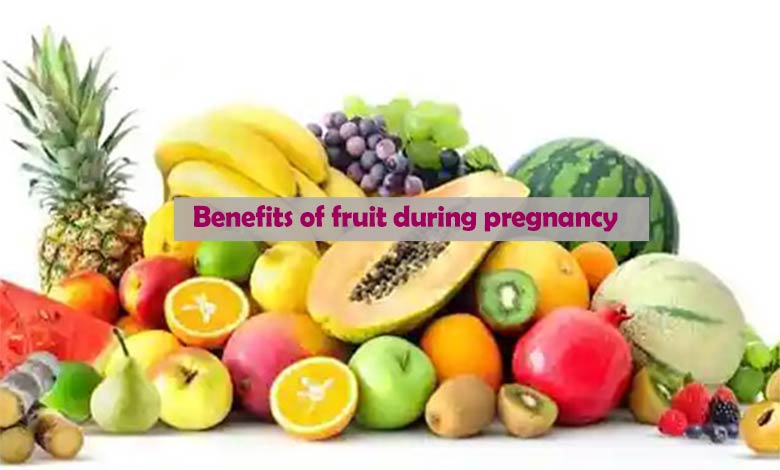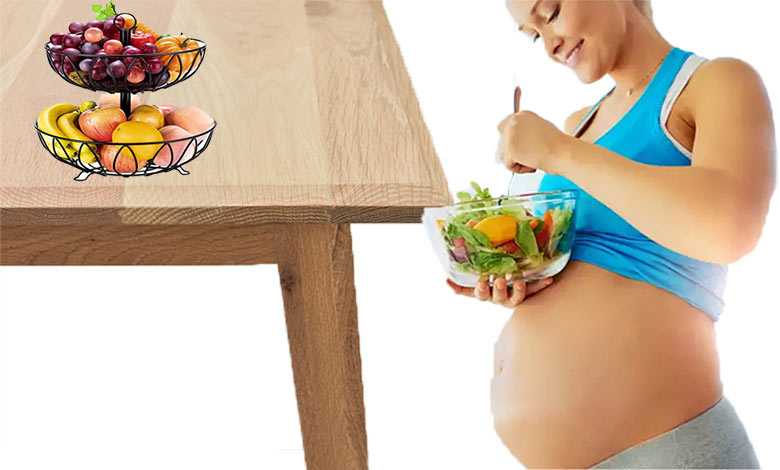What fruits are useful for pregnancy?

Pregnancy is a crucial period when a woman’s nutritional needs increase significantly to support the development of the growing fetus. Consuming a well-balanced diet that includes a variety of fruits is essential to provide essential nutrients, vitamins, minerals, and fiber for both the mother and the baby. This article aims to provide a comprehensive guide on the fruits that are safe and beneficial to consume during pregnancy, highlighting their nutritional value and potential health benefits.
Women should choose healthy foods during pregnancy, as the nutrients necessary for the growth and development of the fetus are provided through their diet. A nutritious diet is essential for everyone’s health, effective body function, and reduced risk of disease.
Related article: What nutrients should a pregnant woman avoid?
Useful fruits in pregnancy
Most people know that a healthy diet should include plenty of fruits, vegetables, whole grains, lean proteins, and healthy fats. But they may not have enough information about fruits that are useful during pregnancy. In this article, we explain why it is important to eat fruit during pregnancy. Also, what fruits should pregnant women eat or not?
The benefits of eating fruit during pregnancy
Fruits provide the vitamins and nutrients necessary during pregnancy. Choosing a diet is very important for the growth and development of the fetus. In addition to supporting fetal development, increasing the intake of vitamins and minerals can help pregnant women keep their bodies in the best possible condition.
Consuming plenty of fresh fruit during pregnancy can guarantee the health of the mother and fetus. Fresh fruit is full of vitamins and nutrients and is also a good source of fiber.
Benefits of fruit during pregnancy
The best fruits you can eat during pregnancy Eating fruit as a breakfast or snack for pregnant women is a good way to increase your vitamin intake and curb sugar cravings. A list of the best fruits that should be included in the diet during pregnancy is:
Apricot
- Apricot is beneficial for baby growth and development of the baby by having the following ingredients. Vitamins A, C, and E
- Calcium (strengthener bones and teeth, necessary for blood clotting, contraction and proper functioning of muscles, hormone secretion, etc.)
- Iron (preventing anemia, building proteins essential for the body, etc.)
- Potassium (a component that balances the body’s PH, controls blood pressure, reduces the risk of stroke, etc.)
- beta-carotene (it is a precursor of vitamin A and is one of the powerful antioxidants)
- Phosphorus (formation of bones and teeth, creation of proteins for growth, maintenance, and repair of cells and tissues, proper functioning of the kidneys, normal heartbeat, etc.)
- Silica (protecting collagen, strengthening bones and treating osteoarthritis, improving the digestive system and boosting the body’s immune system, etc.)

Orange
- Oranges help keep the body hydrated and healthy and are an excellent source of:
- Vitamin C (prevents cell damage and helps absorb iron)
- Folate (one of the necessary vitamins for the formation of red and white blood cells in the
- bone marrow, converting carbohydrates into energy and preventing neural tube defects, etc.)
- Neural tube defects can cause abnormalities such as spina bifida (a disease of the spinal cord in which the spine does not develop properly) and anencephaly (children with this disorder are missing a large part of their brain and skull).
Mango
Mangoes are rich in vitamins A and C. By consuming one cup of chopped mango, you can provide 100% of the recommended daily amount of vitamin C and over 30% of the vitamin A you need. If your baby is deficient in vitamin A at birth, his or her immunity will be lower and the possibility of complications after birth, such as respiratory infections, will increase.
Don’t forget that high vitamin A intake during pregnancy is associated with risks, which are explained in detail in this article.
Pear
The nutrients in pears include:
Fiber (a high-fiber diet is helpful in reducing and treating constipation during pregnancy)
Potassium (useful for mother’s and baby’s heart health, stimulates cell repair)
Pomegranate
By eating pomegranates during pregnancy, pregnant women can provide many of the nutrients their bodies need, including:
- Vitamin K (necessary to maintain healthy bones)
- Vitamin C (increases iron absorption)
- Group B vitamins (pomegranate has anti-nausea properties due to the presence of these
- vitamins, and eating it on an empty stomach can solve the problem of nausea and vomiting
- during pregnancy)
- Calcium
- folate
- Iron (the iron in pomegranate prevents anemia).
- Protein
- fiber and…
Pomegranate, which is rich in other nutrients (such as thiamine, niacin, phosphorus, zinc, etc.), is considered a good source of energy and can provide the calories needed by a pregnant woman. According to research, drinking pomegranate juice during pregnancy can protect the placenta.
Avocado
Avocados are a great source of:
- Vitamins C, E, and K
- Unsaturated fatty acids (the healthy fats in this fruit provide energy and prevent neural tube defects and also strengthen the cells responsible for building the growing baby’s skin and brain tissues)
- fiber
- B group vitamins, especially vitamin B9 or folic acid, help the fetus avoid neural tube defects, so it won’t suffer from birth defects. Doctors recommend pregnant mothers who are pregnant with twins take folic acid.
- Potassium (relieves the pain caused cramps or leg cramps which are very common in the first trimester of pregnancy. The amount of potassium in avocado is almost twice the amount of potassium in the banana)
- Copper
In addition to the above, avocado is rich in antioxidants, proteins, and phytonutrients.
banana
The following nutrients are found in abundance in bananas:
- C vitamin
- potassium
- Vitamin B-6 (eliminates nausea and vomiting in early pregnancy)
- Fiber (relieves pregnancy-related constipation)
Grape
The nutrients in grapes can help with biological changes during pregnancy. Eating large amounts of grapes can increase the absorption of the following nutrients:
- Vitamins C and K
- folate
- Antioxidants (it is full of antioxidants that strengthen the immune system, such as flavonol, tannin, linalool, anthocyanin, and granular, which also prevent infections).
- fiber
- Organic acids
- Pectin (a type of water-soluble fiber useful for reducing intestinal problems, hunger, weight loss, and cholesterol)

Different types of berries
Berries are high in water (88 percent), so they’re a great source of hydration. The following nutrients are abundant in different types of berries:
- Vitamin C (helps absorb iron and strengthen the immune system)
- Healthy carbohydrates (9.8%)
- Antioxidants
- Fiber (1.7%)
Apple
Eating apples during pregnancy can reduce the risk of asthma and allergies in the baby. The apple also contains magnesium (1%), iron (1%), protein (0.26 grams), etc. Consumption of apples during pregnancy reduces nausea, pain, the risk of premature birth, and the risk of diabetes. Apples are rich in the following nutrients:
- Vitamins A and C
- fiber
- potassium
- B group vitamins
- Carbohydrates (100 grams of apples have about 14 grams of healthy carbohydrates)
Dried fruit
All the nutrients found in fresh fruit are also found in dried fruit; Therefore, by consuming pieces of dried fruit daily during pregnancy, you can get the vitamins and minerals you need.
However, you should note that dried fruit is likely to contain more sugar and lack the high volume of water found in fresh fruit, meaning it doesn’t help in the digestive process.
Pregnant women should avoid consuming lots of dried fruits and fruit juices. It is best to eat dried fruit together with fresh fruit, and fresh fruit should not replace dried fruit. Dried fruits contain the following energy and nutritional elements:
- fiber
- Vitamins and minerals
Nutritional Benefits of Fruits during Pregnancy:
Fruits are rich in various nutrients, including vitamins, minerals, antioxidants, and dietary fiber. These nutrients play a vital role in supporting the growth and development of the fetus, preventing maternal complications, and promoting overall maternal health. This section highlights the nutritional benefits of fruits during pregnancy.
Safe Fruits to Consume during Pregnancy:
Certain fruits are considered safe and highly recommended during pregnancy. These fruits not only provide essential nutrients but also aid in alleviating common pregnancy discomforts and promoting a healthy pregnancy. Some examples of safe fruits include apples, oranges, bananas, strawberries, and mangoes. Each fruit is discussed in detail, emphasizing its nutritional content and potential health benefits.
Fruits to Avoid during Pregnancy:
While most fruits are safe for consumption during pregnancy, there are a few exceptions that should be avoided due to potential risks. This section discusses fruits that are best to be avoided during pregnancy, such as unpasteurized juices, underripe papaya, and pineapple. Clear explanations are provided to ensure expectant mothers make informed decisions regarding their fruit choices.
Precautions and Guidelines:
To ensure optimal safety and health during pregnancy, certain precautions and guidelines should be followed when consuming fruits. This section provides important tips on selecting, storing, and preparing fruits to minimize the risk of foodborne illnesses and maximize their nutritional benefits.
Incorporating Fruits into a Pregnancy Diet:
Including a variety of fruits in a balanced diet is essential during pregnancy. This section offers practical suggestions and ideas on how to incorporate fruits into daily meals and snacks, ensuring an enjoyable and nutritious pregnancy diet.
How much fruit is OK during pregnancy?
During pregnancy, it is generally recommended to consume a variety of fruits as part of a healthy and balanced diet. The exact amount of fruit that is considered appropriate can vary depending on individual factors such as overall calorie needs, body weight, and specific dietary requirements. However, the American College of Obstetricians and Gynecologists (ACOG) and other health organizations provide general guidelines regarding fruit consumption during pregnancy.
The ACOG recommends that pregnant women aim for around 2-4 servings of fruit per day. A serving size is typically considered to be one medium-sized fruit (such as an apple or orange) or ½ cup of chopped or sliced fruit. It is important to note that these recommendations may vary slightly depending on the specific country or region.
In addition to the recommended number of servings, it is beneficial to consume a variety of fruits to obtain a diverse range of nutrients. Different fruits offer different types and amounts of vitamins, minerals, antioxidants, and fiber. By incorporating a mix of fruits into their diet, pregnant women can maximize their nutritional intake.
However, it is essential to listen to your body and individual needs. If you have any specific dietary concerns or medical conditions, it is advisable to consult with a healthcare provider or a registered dietitian who can provide personalized guidance based on your unique circumstances.
Remember, maintaining a well-rounded and varied diet that includes other food groups, such as vegetables, whole grains, lean proteins, and dairy or alternatives, is equally important during pregnancy to ensure optimal nutrition for both the mother and the baby.
What is the best time to eat fruits during pregnancy?
The timing of fruit consumption during pregnancy does not have any specific guidelines. However, it is generally recommended to spread out fruit consumption throughout the day as part of a well-balanced diet. Here are a few considerations regarding the timing of fruit consumption during pregnancy:
Between meals: Consuming fruits as a snack between meals can help provide a nutrient boost and keep energy levels stable. It can also help satisfy hunger and cravings in a healthy way.
With meals: Including fruits as part of your main meals, such as adding sliced fruits to a salad or having a fruit smoothie with breakfast, can enhance the nutritional value of the meal and provide a natural source of sweetness.
Before or after physical activity: If you engage in physical activity or exercise during pregnancy, having a small serving of fruit before or after your workout can help replenish energy and provide essential nutrients.
As a dessert: Fruits can be a healthy and refreshing option for dessert. Instead of opting for sugary treats, consider having a serving of fruit to satisfy your sweet tooth while also benefiting from the nutritional content.
It’s important to note that individual preferences and digestive comfort should be taken into account. Some women may find it more comfortable to consume fruits at certain times of the day, while others may experience digestive discomfort if they eat fruits too close to a meal. Pay attention to your body’s cues and adjust your fruit consumption accordingly.
Lastly, remember to wash fruits thoroughly before consuming them to reduce the risk of potential foodborne illnesses. Enjoy a variety of fruits throughout the day to reap their nutritional benefits and support a healthy pregnancy.
Can I eat more fruits than vegetables during pregnancy?
While both fruits and vegetables are important components of a healthy pregnancy diet, it is generally recommended to consume a larger proportion of vegetables compared to fruits. Vegetables provide a wide range of essential nutrients, including vitamins, minerals, fiber, and phytochemicals, that are vital for the proper growth and development of the baby and the overall health of the mother.
Here are a few reasons why vegetables should be emphasized alongside fruits during pregnancy:
Nutrient density:
Vegetables tend to be more nutrient-dense than fruits, meaning they contain a higher concentration of vitamins, minerals, and other beneficial compounds per calorie. This makes vegetables an excellent source of essential nutrients that are needed during pregnancy, such as folate, iron, calcium, and vitamin C.
Fiber Content:
Vegetables are typically higher in dietary fiber than fruits. Fiber is essential for maintaining proper digestion, preventing constipation, and promoting healthy blood sugar levels. It also helps in managing weight gain during pregnancy and may reduce the risk of gestational diabetes.
Lower sugar content:
While fruits are natural sources of sugar, some varieties can be relatively high in sugar content. Consuming excessive amounts of fruits with high sugar content may contribute to increased calorie intake and potentially affect blood sugar levels. On the other hand, vegetables are generally lower in sugar and can be consumed in larger quantities without the same concerns.
Variety of nutrients:
Vegetables offer a wider variety of nutrients compared to fruits. By including a diverse range of vegetables in your diet, you can ensure that you receive a broader spectrum of essential vitamins, minerals, and antioxidants, which is beneficial for both maternal and fetal health.
Although vegetables should be emphasized, it is still important to include a moderate amount of fruits in your pregnancy diet. Fruits provide their own unique set of nutrients and offer natural sweetness while being a healthier alternative to processed sweets. Aim for a balance by including a variety of colorful vegetables and a moderate amount of fruits to meet your nutritional needs during pregnancy.
It is recommended to consult with your healthcare provider or a registered dietitian to receive personalized guidance on the ideal proportions of fruits and vegetables based on your specific dietary requirements and health status.
Which fruit is good for a baby’s brain during pregnancy?
During pregnancy, certain fruits can provide essential nutrients that support the development of the baby’s brain. The following fruits are known for their beneficial effects on brain health and are recommended for consumption during pregnancy:
- Avocado: Avocados are rich in healthy fats, particularly monounsaturated fats, which are crucial for brain development. They also contain vitamin E, folate, and potassium, all of which contribute to overall brain health.
- Berries: Berries, such as blueberries, strawberries, and raspberries, are packed with antioxidants that help protect the brain from oxidative stress. They are also a good source of fiber and vitamins C and K, which are beneficial for brain health.
- Oranges: Oranges are known for their high vitamin C content, which is essential for the production of neurotransmitters in the brain. Vitamin C also acts as an antioxidant and supports overall brain function.
- Kiwi: Kiwi is a fruit that is rich in vitamin C, vitamin E, and folate, all of which play important roles in brain development and function. It also contains antioxidants that protect against oxidative damage.
- Pomegranate: Pomegranate is a fruit that is rich in antioxidants, particularly polyphenols, which have been shown to have neuroprotective effects. Pomegranate juice may enhance brain function and memory.
- Bananas: Bananas are a good source of potassium, which helps maintain proper brain function and electrical activity. They also contain vitamin C, vitamin B6, and fiber, which support overall brain health.
- Chia Seeds: While technically not a fruit, chia seeds can be added to fruit smoothies or used as a topping. They are an excellent source of omega-3 fatty acids, which are essential for brain development.
It is important to note that while these fruits provide beneficial nutrients for brain development, a well-balanced diet that includes a variety of fruits, vegetables, whole grains, lean proteins, and healthy fats is crucial for overall fetal development and maternal health during pregnancy.
Always consult with your healthcare provider or a registered dietitian for personalized advice and guidance on the best nutrition plan for you and your baby during pregnancy.
How many fruits per day is safe?
The recommended daily intake of fruits can vary depending on factors such as age, sex, overall calorie needs, and individual dietary requirements. However, the general guidelines suggest consuming a certain number of servings or portions of fruits per day. The following recommendations are based on the dietary guidelines provided by various health organizations:
The American Heart Association suggests consuming 4-5 servings of fruits per day for adults, which translates to roughly 2 cups of fruits.
The U.S. Department of Agriculture’s MyPlate guideline recommends filling half of your plate with fruits and vegetables combined. For a standard 2,000-calorie diet, this is equivalent to about 2 cups of fruits per day.
The World Health Organization (WHO) recommends consuming at least 400 grams (around 5 servings) of fruits and vegetables per day. However, it is important to note that this recommendation includes both fruits and vegetables combined.
The Centers for Disease Control and Prevention (CDC) suggests aiming for 2 cups of fruit per day based on a 2,000-calorie diet.
These guidelines provide a general framework for fruit consumption. However, it is essential to listen to your body’s needs and individual dietary requirements. Some individuals may require more or fewer servings of fruits based on their specific circumstances and nutritional needs.
It is important to diversify your fruit choices to obtain a variety of nutrients and health benefits. Including a mix of different types and colors of fruits in your diet can help ensure a wide range of vitamins, minerals, antioxidants, and dietary fiber.
Remember to consult with your healthcare provider or a registered dietitian for personalized advice, especially if you have any specific dietary concerns or medical conditions, or if you are following a special diet during pregnancy or any other stage of life.
How many bananas can you eat a day while pregnant?
Bananas are a nutritious and safe fruit to consume during pregnancy. They are a good source of several essential nutrients, including potassium, vitamin C, vitamin B6, and dietary fiber. However, as with any food, moderation is key. While there is no specific limit on the number of bananas you can eat per day during pregnancy, it is generally recommended to consume a variety of fruits to obtain a diverse range of nutrients.
Eating one to two bananas per day is considered a healthy and reasonable amount for most individuals, including pregnant women. This allows you to enjoy the nutritional benefits of bananas without overdoing it. However, it’s important to consider your overall diet and ensure you’re also consuming a variety of other fruits and vegetables to obtain a wide range of nutrients necessary for a healthy pregnancy.
If you have any specific dietary concerns or if you’re unsure about the ideal amount of bananas for your individual needs, it is recommended to consult with your healthcare provider or a registered dietitian who can provide personalized advice based on your unique circumstances. They can help you determine the appropriate amount of bananas and other fruits to incorporate into your pregnancy diet.
How much fruit is allowed during pregnancy?
Final word
Consuming a diverse range of fruits during pregnancy is beneficial for both the mother and the developing baby. The nutritional value and potential health benefits of fruits make them an integral part of a well-balanced pregnancy diet.
By following the recommended guidelines and making informed choices, expectant mothers can enhance their overall health and support the optimal development of their babies.
Fruits are introduced as an excellent source of essential nutrients for the body during pregnancy, providing vitamins, folic acid, fiber, and other nutrients useful for the health of mother and child. These nutrients can also ease pain and some common problems during pregnancy.
During pregnancy, you should eat at least 5 units of different fruits and vegetables a day. The fruits mentioned in this article are good options, especially for pregnancy. During this time, you should reduce your intake of nuts and fruit juices because their sugar and calories are more than fresh fruit.
We hope that in this article we have answered all your questions about the fruits that are useful to eat during pregnancy. If you have any questions regarding this, you can share them in the comment section of this article.
